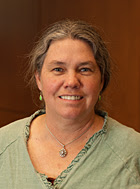Rebekkah Smith Aldrich’s recent essay, “Local Supports Local Sustainability,” (Library Journal, July 11, 2016 http://lj.libraryjournal.com/2016/07/lj-in-print/local-supports-local-sustainability/ ) offers an idea that I believe is essential not only for the future of libraries, but more generally for a systemic transition to sustainable, resilient communities. Aldrich writes,
“As we strategize about our unique value position for the future, nothing is more unique than our “local.” Each town, campus, and school that has a library has a culture and physical environment of its own that needs to be nurtured, preserved, and celebrated.”
It strikes me, though, that library re-localization is not going to happen without a fight. In academic libraries, at least, the responsibility for “local” is almost entirely confined to Special Collections, and discussion about the Future of Libraries is dominated by a kind of technological futurism that is distinctly anti-local.
Academic librarians, accustomed to thinking of libraries mainly as repositories of global scholarship and research, have been slow to grasp the importance of re-localization. The hot trends are all towards better access to conventionally published academic books and journals, e.g. bundled journal subscriptions, approval plans, eBook collections, patron-driven purchasing, and digitization. As H. Thomas Hickerson sums it up, “Most of our collections funding is devoted to licensing electronic publications, and most of those publications are academic journals. And most of what we buy is being bought by everyone.”
This de-valuing of unique local knowledge stems from an academic culture that generally treats scholars and scholarship as placeless. But in his classic “Becoming Native to this Place,” Wes Jackson argues that this placelessness does a disservice to students.
To a large extent, this book is a challenge to the universities to stop and think what they are doing with the young men and women they are supposed to be preparing for the future. The universities now offer only one serious major; upward mobility. Little attention is paid to educating the young to return home, or to go some other place, and dig in. There is no such thing as a “homecoming” major.
The problem, of course, is not that globalized, online information is bad (In Orion Magazines “Thirty-Year Plan” at least one author mentions global access to information as essential for sustainability). The problem is that a steady diet of globalized information without local and hyper-local information is dangerously incomplete. The Internet is great at spreading globalized information, but Robert Michael Pyle calls the current moment in history a “Dark Age of place-centered knowledge,” and Bill McKibben describes the local information gap in “The Age of Missing Information,” where he addresses the question: In a globalized world, how do we learn about the places where we actually live?
The LibQual+ Survey used by many academic libraries measures three dimensions: Affect of Service, Information Control and Library as Place. However, in the survey, questions about “place” are limited to physical facilities, lighting, cleanliness and such. It seems to me that the LibQual+ understanding of place is far too reductive. What if Academic Librarians stopped thinking of libraries as information access points in glorified study halls and started from a premise that the academic library is integral to the place-based identity of the whole campus? What would it take for academic libraries to truly foster resilient community within the constantly shifting flow of scholars and students? In any case, I believe that if we academic librarians understood the true relation between library and place, we would be using an evaluation metric that incuded local information as part of the equation.
Aldrich leaves us with this challenge:
Libraries need to be part of the localism movement in bigger and more obvious ways.
Yes we do. Let’s get to work.
REFERENCES
Hickerson, H. Thomas. “Rebalancing the Investment in Collections.” Research Library Issues: A Bimonthly Report from ARL, CNI, and SPARC, no. 277 (December 2011): 1–8. http://publications.arl.org/rli277/
Jackson, Wes. Becoming Native to this Place. University Press of Kentucky, 1993, p.3.
Lyons, Charles. “The library: A distinct local voice?.” First Monday 12, no. 3 (2007).
McKibben, Bill. The age of missing information. Random House, 1992.
Pyle, Robert Michael. “No child left inside: nature study as a radical act” in Place-based education in the global age. Gruenewald, David A. and Smith, Gegory A. eds. New York, Londaon: Lawrence Erlbaum Associates, p.155-172.
Thirty Year Plan: An Orion Reader. Orion Magazine. 2012.
Submitted by Amy Brunvard
